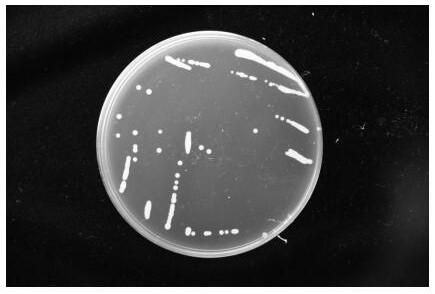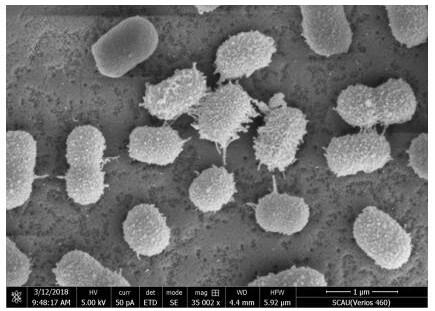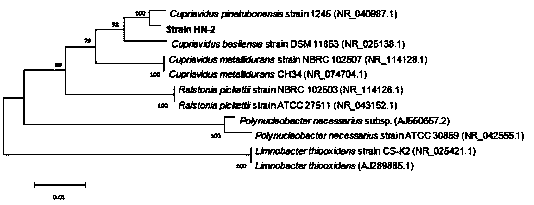A dsf quorum sensing signal molecule quenching bacterium and its application in plant disease control
A quorum sensing signal and molecular technology, applied in applications, plant growth regulators, microorganism-based methods, etc., can solve the problem of rare DSF degrading bacteria, and reduce the problem of antibiotic abuse, pesticide residue pollution, black rot disease The degree of lightening, the effect of good adaptability
- Summary
- Abstract
- Description
- Claims
- Application Information
AI Technical Summary
Problems solved by technology
Method used
Image
Examples
Embodiment 1
[0043] Example 1 Isolation and identification of bacterial strain HN-2
[0044] 1. Isolation and screening of strains
[0045] (1) The soil was collected from the rice rhizosphere soil in the experimental field of South China Agricultural University in Guangzhou City, Guangdong Province, and the soil was yellowish brown.
[0046] (2) Isolation and purification of strains
[0047] Prepare MM medium, divide it into 250 mL Erlenmeyer flasks, fill each bottle with 50 mL of MM medium, sterilize it in a high-pressure sterilizer, and add DSF mother solution in the ultra-clean workbench after it cools down to make the culture medium The final concentration of DSF in the medium was 50 μm / L, and 5 g of soil sample was added to the medium at the same time. After culturing in a shaker at 30 °C and 200 rpm for 7 days, the 10% inoculum was transferred to the second batch of MM medium with a DSF concentration of 100 μm / L. After 7 days of culture under the same conditions, 10% of the inocu...
Embodiment 2
[0060] Example 2 Antibiotic susceptibility analysis of Copper greedy bacteria HN-2
[0061] In order to better study the biocontrol potential of the bacterial strain HN-2 obtained in Example 1, we studied the antibiotic sensitivity of the bacterial strain.
[0062] The result is as Figure 4 As shown, the strain was resistant to rifampicin (RIF) at 400 μg / mL or more, and to chloramphenicol (CM), tetracycline (TC), gentamicin (GEN), ampicillin (AMP) and Kanamycin (KAN) resistance is less than 10 μg / mL.
[0063] The results showed that strain HN-2 exhibited high resistance to rifampicin and low resistance to chloramphenicol, tetracycline, gentamycin, ampicillin, and kanamycin. It is beneficial to select appropriate antibiotics as a reference in follow-up research.
Embodiment 3
[0064] Embodiment 3 Determination of growth and DSF degradation relation curve of copper greedy bacteria HN-2
[0065] 1. Pick a single colony of strain HN-2 and inoculate it in LB medium to pre-culture to the logarithmic phase. After centrifuging the obtained bacterial solution at 4000 rpm for 5 min, discard the supernatant, and use 0.9% anhydrous Rinse and resuspend bacteria in normal saline, as a seed suspension, inoculate 50 mL of MM basal medium with an inoculum of 1-3%, and add DSF mother solution to make the final concentration 2mM, at 30°C, 200 rpm cultured and sampled at regular intervals. Collect samples at different time points and measure OD by spectrophotometer 600 The value represents the growth of strain HN-2, and the residual amount of DSF determined by HPLC represents the degradation of DSF by strain HN-2.
[0066] 2. The relationship between the growth of strain HN-2 and the degradation of DSF when DSF is used as the only carbon source is as follows Figur...
PUM
 Login to View More
Login to View More Abstract
Description
Claims
Application Information
 Login to View More
Login to View More - R&D
- Intellectual Property
- Life Sciences
- Materials
- Tech Scout
- Unparalleled Data Quality
- Higher Quality Content
- 60% Fewer Hallucinations
Browse by: Latest US Patents, China's latest patents, Technical Efficacy Thesaurus, Application Domain, Technology Topic, Popular Technical Reports.
© 2025 PatSnap. All rights reserved.Legal|Privacy policy|Modern Slavery Act Transparency Statement|Sitemap|About US| Contact US: help@patsnap.com



